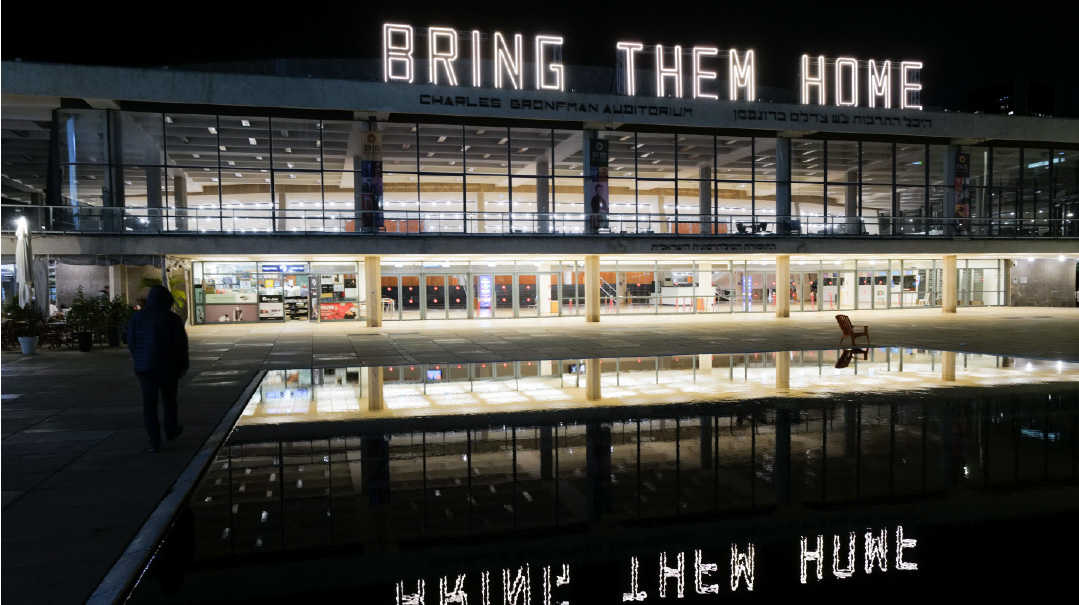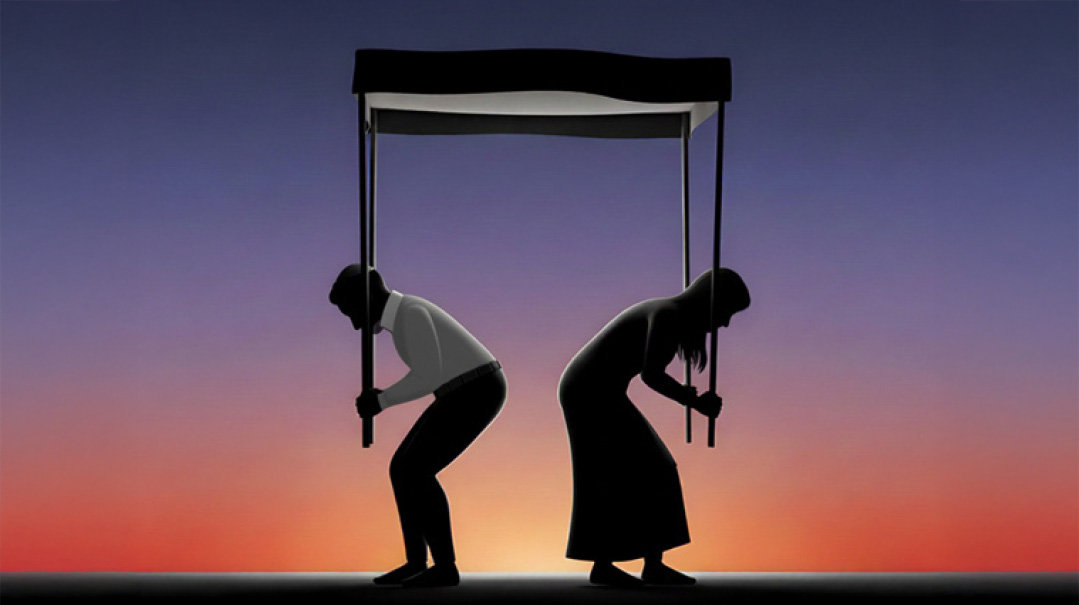Homecoming

The five threads that spooled through my mind as Emily, Doron, and Romi came home

S
unday’s events felt so fateful, so big — too big to fully process or encapsulate in a polished presentation complete with formal opening, development, and conclusion. Here, instead, are the five threads that spooled through my mind as Emily, Doron, and Romi came home.
Those who mourned
Since October 7, the entire Jewish nation has been concerned for the hostages. But to different degrees.
No one feels the horror like their own families. But many, many Jews — of all backgrounds and affiliations — have lived lives shaped and colored by those vibrant faces. They’re the simple wives and mothers who infuse the names and faces of our captive brothers and sisters in every challah baking and every licht bentshing. The college students newly committed to exploring and embracing their Jewish identities.
They’re the people who’ve sworn off social drinking, home renovations, or new clothing until every hostage returns. The yeshivah bochurim who turbocharge their every supplication to the Matir Asurim. That family in Bnei Brak that hung the face of their “chosen hostage” in their kitchen, so every brachah recited around the family supper table takes on extra intensity.
And they’re even those who, during the 471 long days of waiting, expressed their pain through anger, blaming, and shaming. Yes, their weekly protests involved ugly slogans and finger-pointing — but bottom line: They didn’t, couldn’t, live life as usual knowing their fellow Jews were in peril.
When the news was confirmed — three hostages were out of Hamas’s hands — everyone rejoiced. But for those who lived with a gaping hole dozens of souls deep, the joy was that much stronger. Three of those souls were back home. The hole is a bit smaller now.
We know that when our final redemption comes, it’s those who mourned the absence of the Shechinah most keenly who will feel its restoration most. Here, we watched the principle play out before our eyes.
The other return
On Sunday afternoon, every news station, every street conversation, even every schoolkid could discuss only one thing: the return of Emily, Doron, and Romi. But just hours earlier, on Sunday morning, another hostage returned home. The body of Oron Shaul, killed more than ten years ago during Operation Protective Edge of 2014, had been held all this time in Gaza. On Sunday morning, the news was cleared for publication: Oron’s body had been retrieved, returned to Israel, and positively identified.
The juxtaposition was heartbreaking. Two struggles, two returns, two stories with such different conclusions. It’s natural that the thrilling return of three smiling, waving women captured the headlines and hearts of a public so starved for good news.
But let’s not forget the other story: the family that waited so many years for what, in their tragic reality, was the only good news they could get. After more than a decade, Oron’s family could finally grant him his final right — in this case, what had sadly become a privilege — of a kever Yisrael.
Just for this one golden hour
Israelis can be contentious. Very contentious. When their children, or spouses, or neighbors are at risk, then the usual Sabra prickles can turn poisonous. Last week, when the hostage deal was finalized, protestors snarled Israel’s highways and byways. Many were families who’d lost their loved ones during the battles in Gaza. Now, they feared, their sacrifices would be for naught: All the military and political gains sealed with their children’s blood could very likely be reversed — in exchange for a multistage deal that doesn’t even guarantee all the hostages will make it back.
On Sunday afternoon, though, virtually all of those passionate protesters were silent. Later on, they could resume their protests. But just for that one golden hour, no matter their politics or personal opinions about the deal, it was a time of joy. And so they tucked their hesitations and recriminations in a back pocket, swallowing their justified anger and fear at the release of murderers — even the murderers of their own loved ones — and focused on the scene of children coming home.
In their mothers’ arms
We don’t know all the military, medical, and psychological considerations behind the setup for the hostages’ return. But we do know the facts: When the three women, only one of whom had lived with her parents before October 7, returned to Israeli territory, the first — and only — family members there to greet them were their mothers. After they were transported to Sheba Hospital, they reunited with the rest of their families.
It wasn’t even a question: in a moment like this, you need your mother. Remember, this is the country where even tattooed rock stars will proudly serenade their Imas from onstage. Where army watchtowers are graffitied with slogans like “ein kemo ha’ochel shel Ima, no one makes food like Ima.” And where, if you are unfortunate (or stupid) enough to listen to a recording of a terror attack, you will inevitably hear victims screaming Imaaa.
The True Redeemer
You can blame Bibi or Ben Gvir, Halevi or Blinken, Egypt or Qatar or Iran. You can rally and protest and even set off fireworks outside the prime minister’s home. You can debate Trump vs. Biden and bring detailed proofs for either side of the debate. You can pick apart every clause of every stage of negotiation. You can explain that if only Politician A had done B, or Commander X hadn’t done Y, it would all be that much better.
But then, when the salvation comes, a Jew’s instinct invariably leads him back to the Source. Sunday afternoon in the Gonen home, a crowd of family, friends, and neighbors gathered around a large flat-screen TV, watching anxiously, hearts in their throats. The screen depicted mobs of Gazans intent on blocking, or at least delaying, the release of the hostages, and the watchers’ electric anticipation was tinged by more than a little worry.
Finally, finally, the IDF confirmed that the three hostages were out of Hamas’s hands. The first blessing in the room wasn’t for Bibi, Biden, or Trump. It was the brachah of hatov v’hameitiv. And it was addressed, by a man with shaking legs and quivering voice, to the true Redeemer.
May He continue redeeming all those held in that dark alternate universe just across the border. May He redeem us all — because we’ve come to see with frightening clarity that with all the freedom we hold in this seemingly enlightened world, we’re still very much in exile. And may our entire nation finally rejoice in a Divinely perfect deal — an arrangement that doesn’t empower our enemies, that doesn’t leave us in fear of future sacrifices, and that leaves no Jew behind.
(Originally featured in Mishpacha, Issue 1046)
Oops! We could not locate your form.







